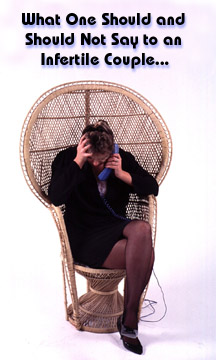|
||
Introduction:Infertility affects nearly one in six couples. Approximately 40% of the time, the problem is related to the female partner, another 40% is related to male difficulties and 20% of the time both partners will have medical problems. Many times, infertility is a symptom of an underlying disease process, a disease process the couples have no control over. To these couples, infertility can be a crisis of the deepest kind. Every menstrual cycle represents a failure and is a time of grief for the potential child that never came to be. The infertile couple will often express their feelings through anger, frustration, feelings of inadequacy, depression and guilt. Relationships with family members with children can suffer, marriages are strained and well-meaning friends and family can overload the couple with advice and pressure. Family and social gatherings become a reminder of infertility. Baby showers can be a traumatic experience. Mother's and Father's Day are often very difficult. We want to offer some tips that provide support to couples who have not yet had the blessing of a beautiful child to love. With your assistance, most couples going though the process of trying to conceive can maintain a positive attitude. |
||
|
||
What You Can Say and Do...Do provide couples with plenty of emotional support by saying "It must be difficult to go through this" and "I'm here to listen if you need to talk." Do remember that men can be just as emotional about the problem, sometimes even more so. They may feel their masculinity is at risk. Do understand the couple's need for privacy. Do try to understand that if they are your employees, frequent doctor's appointments may be necessary during business hours. Please try to accommodate them as much as possible. Not doing so may also be construed as a form of discrimination and place you at legal risk. Do understand why they may not make it to a baby shower or a holiday event. These frequent events can become overwhelming for an infertile couple. Do tell the infertile couple that there is hope. |
||
Conclusions: Please be kind, thoughtful and always supportive. |
| fertility@dreamababy.com | |||
| HomeAbout UsPatient EducationOur Success RatesEgg DonationSurrogacyEmbryo DonationDownload CenterContact UsWeb Site PolicyFeedbackNewsletter SignupSearchResources | |||






